
It may seem like a great idea to get your guinea pig and rabbit together for some furry friends, but it’s not necessarily the best decision.
Although guinea pigs and rabbits can coexist peacefully, it’s not recommended to house them together as pets due to different dietary and social needs. Rabbits have a tendency to bully guinea pigs and could even harm or kill them if they feel threatened.
Here are five reasons why getting a guinea pig and rabbit together as buddies are not the best idea.
Guinea Pigs and Rabbits Living Together
Guinea pigs and rabbits are often kept as household pets, but housing them together is not always the best idea. Both animals have different dietary and social needs that can lead to conflict when housed together.
Rabbits are naturally more dominant and may bully guinea pigs, causing stress and potentially even harm. Additionally, guinea pigs require a specialized diet high in vitamin C that rabbits do not, and rabbits have much higher exercise needs than guinea pigs.
While the two animals can coexist peacefully, it’s important to consider their unique needs and make sure they each have their own suitable living space. It’s recommended to provide separate housing for each species to ensure their health and well-being.
Reasons why it may not be the best idea
When considering whether to keep guinea pigs and rabbits together, there are several important factors to consider. Though these animals have a lot in common, such as their small size and herbivorous diet, they remain fundamentally different species with differing needs.
The main reason it’s not the best idea for guinea pigs and rabbits to live together is due to health concerns. Guinea pigs can easily contract diseases from rabbits which can be difficult or impossible to treat. Moreover, as prey animals, guinea pigs may feel intimidated by larger rabbits, leading to increased stress levels that could impact their well-being.
In addition, guinea pigs are usually much more social than rabbits and require plenty of companionship from other guinea pigs or humans. Even if both species seem fine when living together initially, over time stress and illness can arise with potentially devastating consequences for the small animals involved.
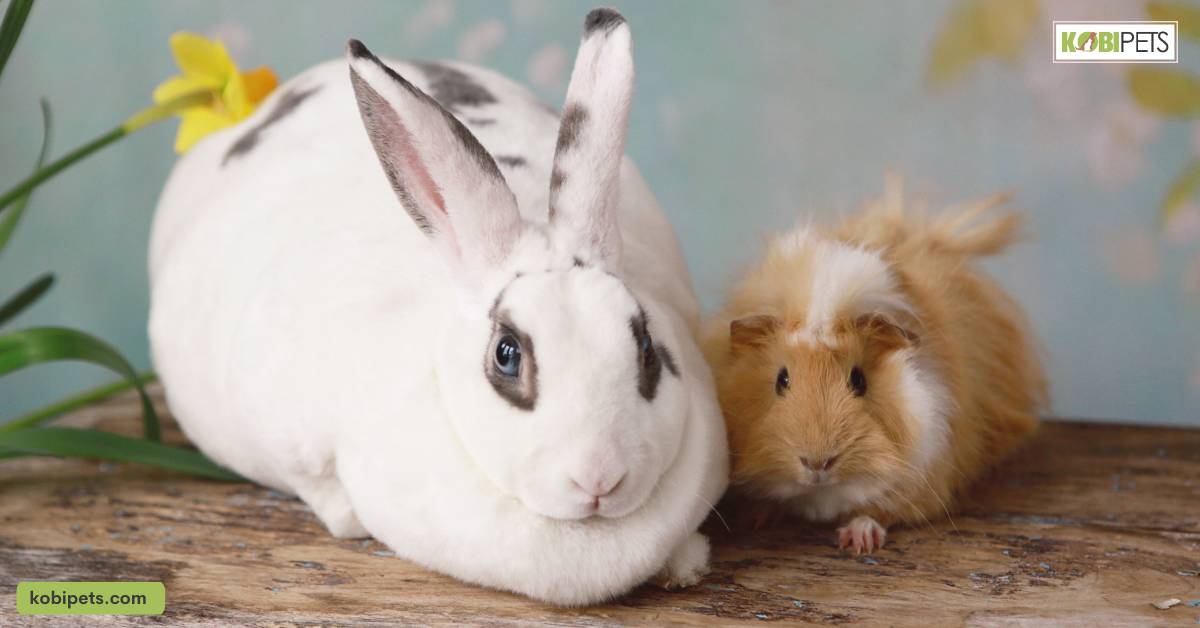
Reason 1: Different Dietary Needs
When it comes to keeping guinea pigs and rabbits as pets, it’s important to understand their different dietary needs. While both pets require a balanced diet, some key differences make it difficult for them to share the same living space and food.
In this table, we’ll compare the dietary needs of guinea pigs and rabbits and highlight why they can’t live together:
| Rabbits | Guinea Pigs | |
| Fiber | High Fiber Diet: Rabbits require a diet high in fiber to maintain digestive health and prevent stasis. |
Lower Fiber Diet: Guinea pigs do not require as much fiber in their diet, but still need some to maintain gut health.
|
| Vitamin C | Low Vitamin C: Rabbits do not require a high amount of Vitamin C in their diet. |
High Vitamin C: Guinea pigs need a diet high in Vitamin C to maintain their overall health and prevent scurvy
|
From this comparison table, it’s clear that guinea pigs and rabbits have different dietary needs that cannot be easily met if they are living together. It’s important to provide each pet with a balanced diet that meets their nutritional requirements and to not mix their diets or food bowls. This will help ensure that both pets remain healthy and happy.
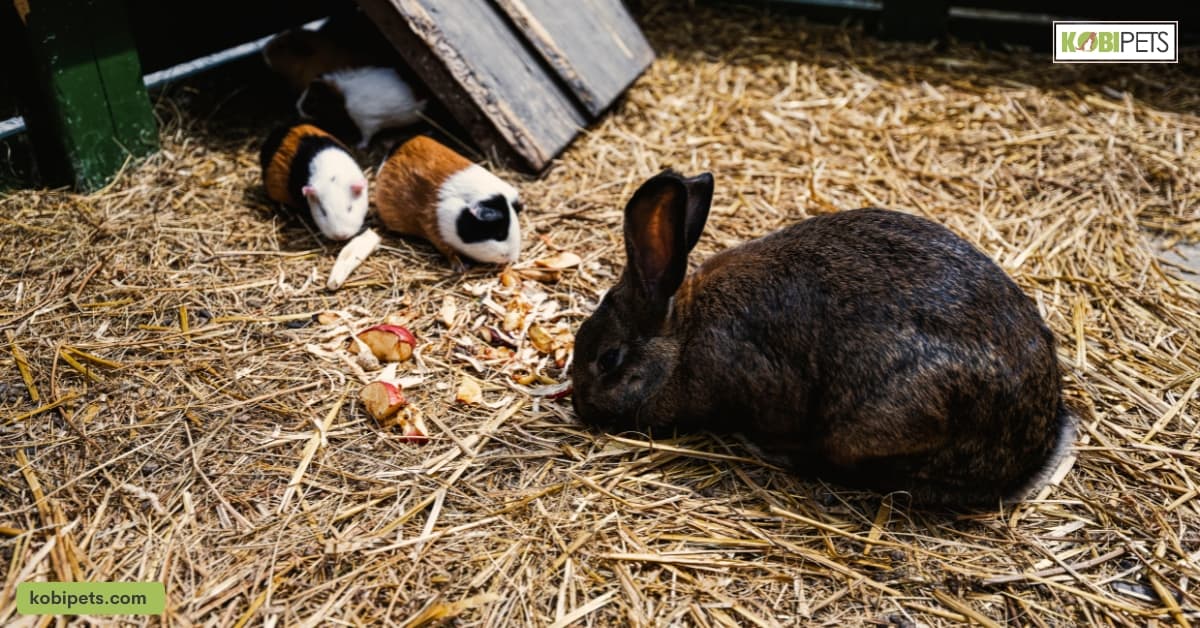
Reason 2: Social Needs
When deciding to add a new pet to your home, it’s important to consider all the factors associated with the type of animal you want. Guinea pigs and rabbits can seem similar enough to cohabitate, but there are a few reasons why this isn’t a good idea for many households.
Here’s a comparison table that looks more closely at their social needs:
| Rabbits | Guinea Pigs | |
| Social Needs | High | Low-Moderate |
| Social Behavior | Outgoing & Interactive (depends on the breed) |
Shy & Passive (depends on the individual guinea pig )
|
| Interactions With Other Pets/Humans | Generally tolerant of other animals & people, when given time to adjust; tends to enjoy companionship and playtime with humans/other pets in certain scenarios |
Usually fearful of strangers, although some guinea pigs may slowly warm up to shared company depending on their past experiences; typically prefer alone time or in small groups with familiar faces
|
Rabbits Are More Social Than Guinea Pigs
In general, rabbits are much more social than guinea pigs – they’re usually quite friendly and outgoing. Depending on the specific breed, rabbits can range from timidly adjusting well to change around novel environments or objects, to being highly interactive and playful with humans and other pets alike.
While some guinea pigs may eventually become used to being around other animals or people after some acclimation time, they usually don’t actively seek out companionship as rabbits do – they tend to be shy by nature. This makes them prone to feelings of fear and anxiety if exposed abruptly to unfamiliar situations or stimuli that require quick responses.
As such, putting these two types of animals together is not recommended due to their varying social needs.
Guinea Pigs Will Likely Be Bullied by Rabbits
The differences in social behavior between a rabbit and a guinea pig also mean that rabbits are more likely to bully guinea pigs if they’re forced into close quarters together. If a rabbit has been accustomed to living alone or in pairs prior, having it share its space with an unfamiliar species is unlikely to go too well.
Especially since rabbits are instinctually territorial creatures that occasionally spurn contact with strange entities. On the flip side, guinea pigs aren’t as equipped for defense as most rabbits either; their size puts them at a disadvantage should any disagreements arise between them and their perceived rivals which can lead them to feel stressed out every day if sharing a home for an extended period is unavoidable for both parties involved.
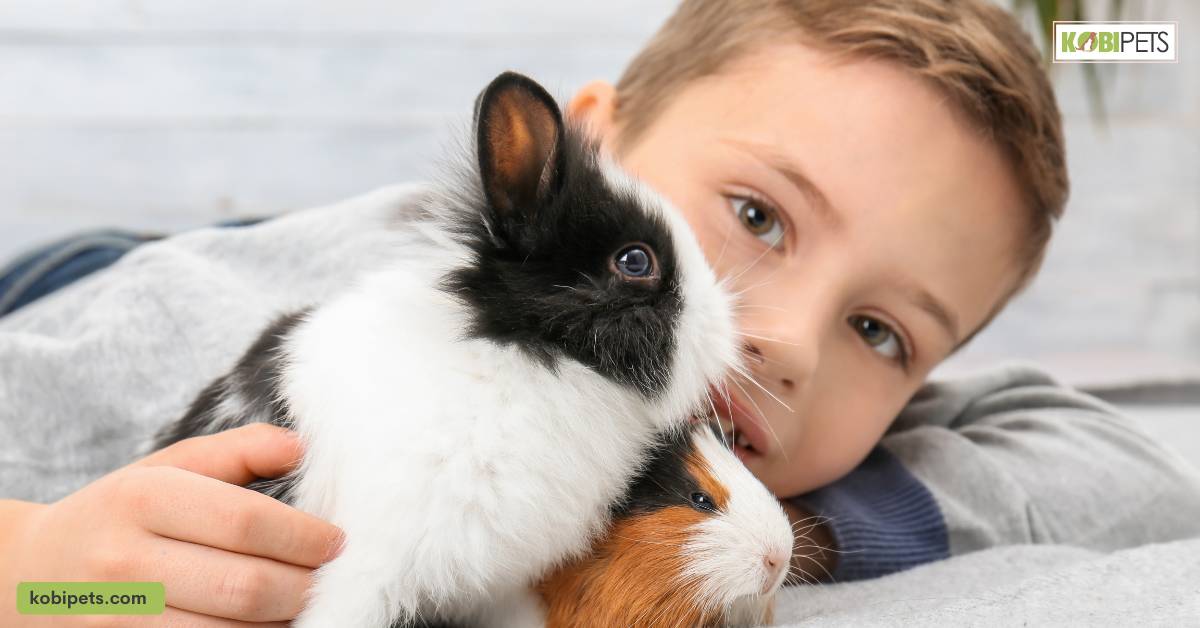
Reason 3: Disease
When considering whether to house a rabbit and a guinea pig together, it’s important to take into account the potential health risks. One major concern is the transmission of diseases, as rabbits and guinea pigs can carry different diseases that can easily spread between them.
Rabbits and guinea pigs carry different diseases that can easily spread between them:
| Disease | Guinea Pig | Rabbit |
| Myxomatosis | No | Yes |
| Rabbit Hemorrhagic Disease (RHD) | No | Yes |
| E. coli | Yes | Yes |
| Pasteurella | Yes | Yes |
| Snuffles | No | Yes |
As this table shows, rabbits and guinea pigs can both carry E. coli and Pasteurella, but rabbits are also prone to diseases such as Myxomatosis and Rabbit Hemorrhagic Disease (RHD) that guinea pigs are not susceptible to. On the other hand, guinea pigs can develop a respiratory infection called “Snuffles” that rabbits are not at risk for.
This highlights the importance of keeping rabbits and guinea pigs separate to prevent the transmission of diseases between them.
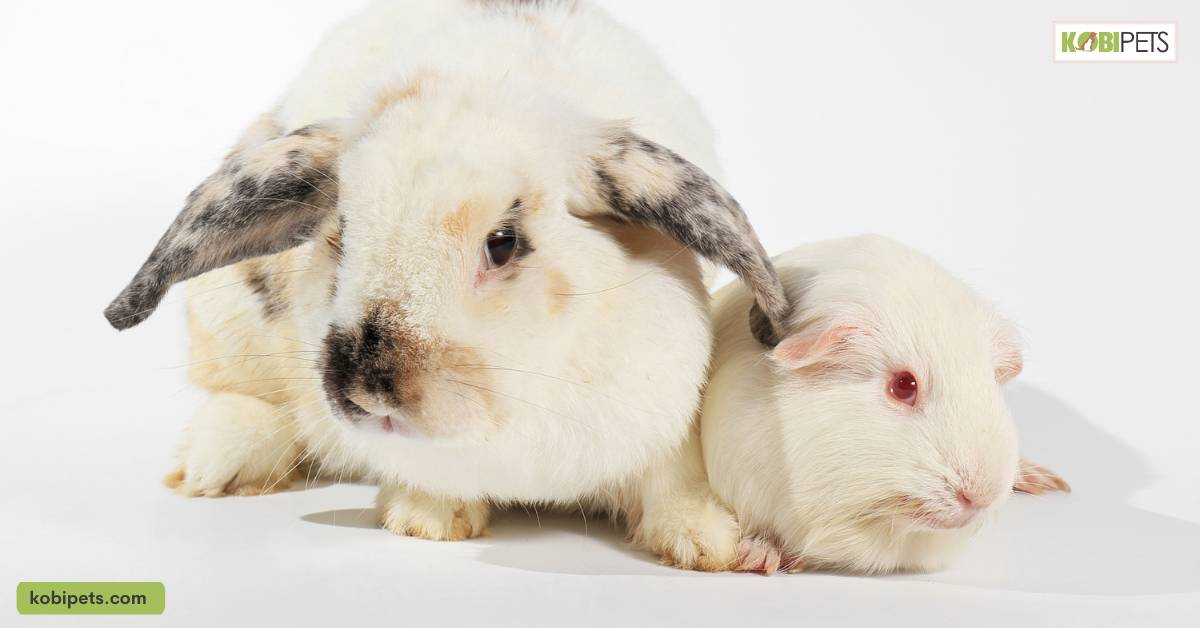
Reason 4: Size Difference
Guinea pigs and rabbits can seem similar enough to cohabitate, but there are a few reasons why this isn’t a good idea for many households.
Here’s a comparison table that looks more closely at their size difference and potential harm:
| Rabbits | Guinea Pigs | |
| Size Difference | Larger than guinea pigs |
Smaller than rabbits
|
| Potential Harms if Not Supervised | May feel threatened & act aggressively towards guinea pigs if they don’t have enough space or social interaction; have been known to attack other small animals in extreme cases |
Much smaller body size makes them vulnerable in comparison; may be accidentally injured or killed by larger rabbit
|
Guinea Pigs Are Much Smaller Than Rabbits
One of the more obvious differences between guinea pigs and rabbits is their overall size – rabbits tend to be much larger than guinea pigs in most cases. This factor alone is enough to dissuade some from choosing these two types of animals as housemates since the lack of physical boundaries can potentially create conflicts later on down the line.
Especially if both species don’t get along as smoothly as one hopes for them to. It also doesn’t help that guinea pigs are particularly slow when it comes to running against other faster creatures – putting them at an even greater risk whenever they find themselves in close quarters with their unfamiliar counterparts.
Rabbits May Harm Or Even Kill A Guinea Pig If They Feel Threatened
The potential harms that could result from having these two species living together should not be understated either; while it’s not guaranteed that any aggressive confrontations will occur in certain scenarios, it is possible depending on what types of personalities each animal has as well as whether or not they have access to enough resources within their shared environment.
Without proper supervision or safety mechanisms in place, an unfriendly rabbit can cause serious injury or even death to a guinea pig if they feel overly threatened by its presence – the latter’s smaller body size could easily become an easy target for bigger predators like cats and dogs found within most homes too.
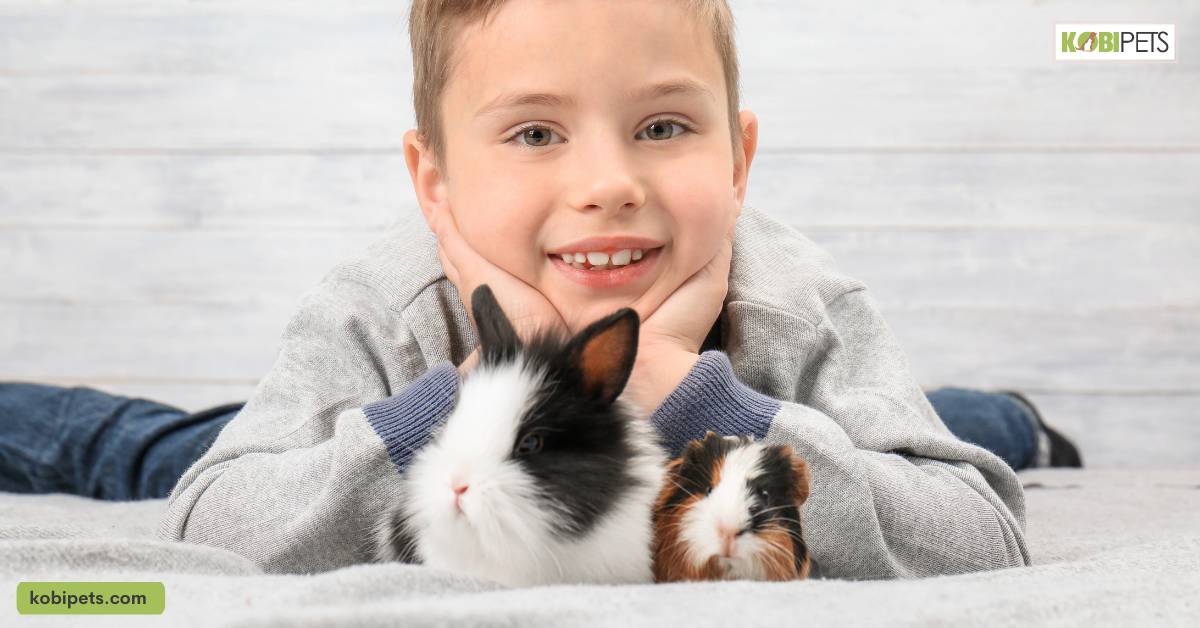
Reason 5: Litter Training
When deciding to add a new pet to your home, it’s important to consider all the factors associated with the type of animal you want. Guinea pigs and rabbits can seem similar enough to cohabitate, but there are a few reasons why this isn’t a good idea for many households.
Here’s a comparison table that looks more closely at their litter training abilities:
| Rabbits | Guinea Pigs | |
| Litter Training Potentials | Yes (depending on breed & individual) | No |
| Suitable Environment Expectations | Most rabbits can be toilet trained given the correct environment, encouragement & patience; typically like to groom themselves in private |
Not litter trained – they will ‘go’ anywhere once they feel comfortable & secure; need access to hay or other absorbent materials outside of their cage
|
Litter training is an important factor when considering which pet would be best suited for one’s lifestyle. In general, rabbits are much better candidates for successful litter training than guinea pigs. Most rabbit breeds will learn how to use a litter box if placed in an appropriate environment with training and patience, while guinea pigs cannot be fully trained like this .
They still need hay or other absorbent materials outside of their cages to go to satisfy their natural nesting instinct. This means that those looking for tidy living spaces should opt for the rabbit option instead of the guinea pig alternative if possible.
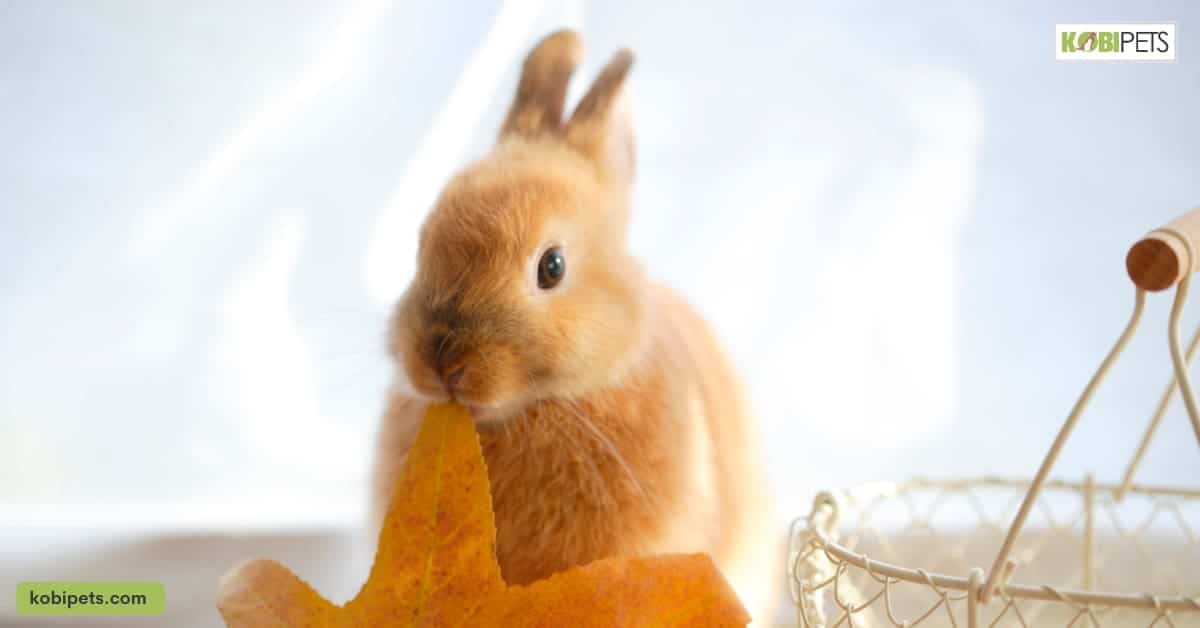
In conclusion
While it may seem like a cute idea to house a rabbit and guinea pig together, it is not always the best idea for their health and well-being. From differences in dietary needs and living habits to the potential spread of diseases, the risks associated with housing these two species together can outweigh any benefits.
It is always best to provide each pet with its own individual living space, proper nutrition, and regular veterinary check-ups to ensure they live long, happy, and healthy lives. Before making any decisions about pet housing, it is always important to do proper research and consult with a veterinarian.






